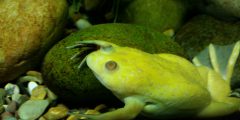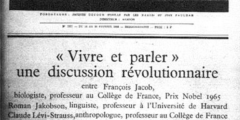Metaphors in the time of coronavirus
March 17, 2020
On Sunday, 15th March, Kenan Malik wrote an article on metaphors for The Observer. This was inspired by Matthew Cobb’s new book on The Idea of the Brain which delves into the many metaphors of and for the brain that have been used over time. I have just started to read that book – a …
Mathematical models, political decision making and public perceptions
March 3, 2020
On Tuesday, 3 March, Boris Johnson revealed the government’s action plan on how to deal with the novel coronavirus and the spread of Covid-19. Despite doubts about the usefulness of experts expressed some years ago by some of his colleagues, he was flanked by experts, namely Sir Patrick Vallance, the Government Chief Scientific Adviser, and …
Gene drives and Trojan horses: A tale of two metaphor uses
February 28, 2020
I was reading a recent article on gene drive entitled “Engineering bugs, resurrecting species: The wild world of synthetic biology for conservation” and came across this sentence about a so-called ‘Medea drive’: “This genetic Trojan Horse could then be used to spread elements that confer susceptibility to certain environmental factors, such as triggering the death …
New metaphors for new understandings of genomes
February 21, 2020
This is a guest post by Sarah Perrault and Meaghan O’Keefe (University of California Davis) based on their article “New metaphors for new understanding of genomes”. The article goes beyond regular complaints about the inadequacy of old metaphors, such as the genome as a blueprint, and beyond regular calls for a new language. Instead, it …
Xenobots-Xenowhats? Living machines and zombie metaphors
January 24, 2020
The other day a colleague asked me what I was up to. I said, ‘I am starting to think about xenobots’. ‘Xeno-whats?’ he asked? I muttered something like ‘you know as in ‘xeno-transplantation’, when another colleague butted in and asked ‘like Xenogenesis?’. ‘Xeno-what?’ I asked. It turns out there is a sci-fi trilogy by Octavia E. Butler written in the …
Gene drive and grey squirrels: Science and media
January 17, 2020
At the beginning of January 2019 an article, entitled “Accelerating Evolution” appeared in The Biologist, a journal published by the Royal Society of Biology (The Biologist 66(6) p18-21). The authors, Bruce Whitelaw and Gus McFarlane, work at the Roslin Institute in Scotland which was involved with the creation of Dolly the cloned sheep in 1996, coincidentally the occasion of …
“It’s just like epigenetics” – scientific metaphors for non-scientific concepts
November 29, 2019
This is a guest post by Cath Ennis. Cath is a Knowledge Translation Specialist with the University of British Columbia’s Human Early Learning Partnership and the Kobor Lab at BC Children’s Hospital Research Institute. *** In our new paper, Brigitte Nerlich, Aleksandra Stelmach and I examined the metaphors used by academic social scientists and alternative …
How to do things with epigenetics
November 22, 2019
We have just published in article on epigenetics in Social Science Information! It’s part of a special issue coordinated by the sociologist Michel Dubois (CNRS, Paris) that is coming out in print at the beginning of the new year. The special issue deals with epigenetics and interdisciplinarity. Our article examines some obstacles that might hinder …
Metaphors and society (and Brexit)
November 8, 2019
I have been interested in metaphors and society for a long time. My thinking has been influenced mainly by people who wrote about metaphor (and society) at the end of the 1970s and early 1980s; for example, Susan Sontag, Donald Schön, Andrew Ortony, George Lakoff and Mark Johnson and others, who examined ‘conceptual’ or ‘generative’ …
Encounters between life and language
September 5, 2019
Philip Ball has just written a great article dissecting new research showing that there is no ‘gene for’ homosexuality. He notes the fallacies behind the facile way of pointing to individual genes and saying what they are ‘for’. This is dangerous, especially when talking about genes for behavioural traits. Single genes don’t determine such traits …
Subscribe by email
About this blog
This blog promotes discussion of topics related to the research programme 'Making Science Public: Challenges and Opportunities'. Our purpose is not to 'make science public'. Instead, we want to study the opportunities that have emerged for science to be more openly practiced and debated, but also the challenges posed by making science public or by promoting the making public of science as a solution to a variety of problems in society and in politics.
This blog will report on these and other issues related to the Leverhulme funded research programme: Making Science Public: Challenges and Opportunities
Useful links
Recent Posts
Categories
- antibiotics
- anticipatory governance
- artifical intelligence
- big data
- biotechnology
- citizen science
- Climate Change
- Climate Politics
- co-production
- coronavirus
- Creationism
- Definition of Science
- designer babies
- disease
- disease
- engineering
- epigenetics
- Food Security
- Food sovereignty
- gene drive
- genomics
- GM Food
- GMOs
- history of science
- Hype
- images and visualisations
- imaginaries
- Immigration
- Impact
- infectious diseases
- innovation
- interdisciplinarity
- Knowledge Society
- Language
- Markets
- Metaphors
- microbiome
- neoliberalism
- Neuroscience
- open access
- Personal Reflection
- Politics
- Public education
- public engagement with science
- public needs
- public participation
- public policy
- public service
- publics
- regulatory science
- Religion
- Republican Party
- research impact
- responsible innovation
- responsive research
- Richard Dawkins
- risk
- Scepticism
- Science
- Science and Government
- science and politics
- Science and Songs
- science communication
- Science Communication
- Science Fiction
- Science Policy
- Social science
- sociology
- space
- space exploration
- synthetic biology
- transparency
- Trust
- Uncategorized
- Uncertainty
- visualisation
- wonder










